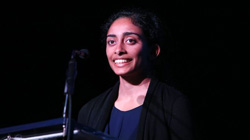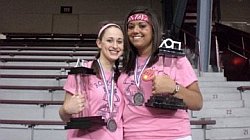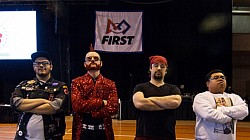INSPIRATION IS EVERWHERE
Featured Image
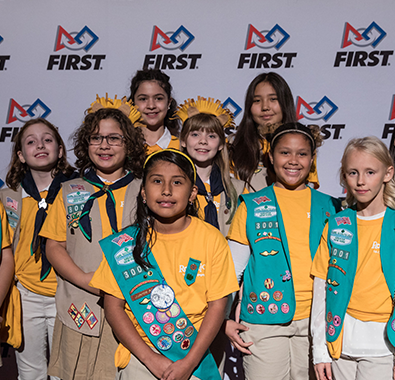
Display Title
Bringing STEM engagement to disadvantaged youth through community-based organizations
Sub Title
STEM Equity Grantees
FIRST Youth-Serving Organizations
Community-based organizations like the YMCA, Girl Scouts, 4-H, and local nonprofits can expand opportunities for young people who are disadvantaged, introducing them to STEM ideas and engagement activities that are not always available in their homes and schools. The FIRST® STEM Equity Community Innovation Grant initiative has identified strategies to help any community organization open STEM pathways for students.
Engaging young people in hands-on STEM learning
School-age children spend only about 20 percent of their waking hours in school. Many young people consider community-based organizations a home away from home. These organizations, some local and others within a national network, give young people a safe place to go after school, on weekends, and during summer vacations. They provide students with a chance to grow new skills — from swimming to raising farm animals. Today, these organizations are increasingly incorporating STEM activities and learning into their program offerings.
Community organizations recognize that our modern economy demands a wide set of skills — including STEM knowledge, digital literacy, and strong leadership, problem-solving, and team-building abilities. They know that young people in disenfranchised communities may not have access to opportunities to build these skills in their classrooms. A study by the Afterschool Alliance found that 69 percent of young people were getting some form of STEM education through an after-school program, but for every child engaged in a program, two were waiting to get in.
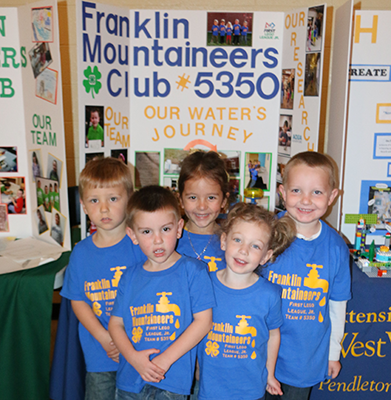
FIRST LEGO League Jr. participants from Pendleton County 4-H attend an expo.
In their book, Science by Stealth, authors Lucy Friedman and Jane Quinn found that 75 percent of Nobel Prize winners say their passion for science was first sparked in a non-school environment. Youth STEM programs facilitated by community organizations like the YMCA and Girl Scouts can be just as important, or even more so, than schools in inspiring young people to develop a lifelong interest in science and technology. These programs offer opportunities to explore STEM ideas via hands-on, real-world experiences, which build critical thinking, teamwork, communication, and other foundational skills.
Identifying strategies for successful after-school STEM programs
Though community organizations want to provide enriching opportunities, they are often constrained in resources, especially when their primary focus is reaching disadvantaged youth. In 2016, youth-serving nonprofit FIRST® launched an initiative to address inequities in STEM, the FIRST STEM Equity Community Innovation Grants. Supported by generous sponsors and donors, grants are awarded each year to schools and community-based organizations throughout the United States and Canada that serve young people whose access to STEM education and enrichment might otherwise be limited.
The grants, which range in size from $5,000 to $50,000, enable educators and facilitators to provide students who are disadvantaged – including underserved, underrepresented, and vulnerable populations – with hands-on learning opportunities and outlets for creative problem solving through FIRST programs. K-12 FIRST programs use team-based robotics competitions to create an inclusive experience, where young people can build self-confidence, STEM knowledge, and a thirst for lifelong learning, helping students build a foundation for a brighter future.
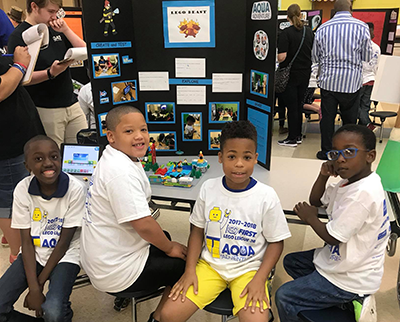
A FIRST LEGO League Jr. team from YouthLink STEM Academy in South Carolina attend an expo.
The effect on many of the students, schools, and communities receiving FIRST programs through the grants has been transformative. In Central Maryland, Latina students at the YMCA are competing successfully alongside boys and girls from much wealthier schools. In West Virginia, young people from farming communities are gaining 21st century skills in technology and problem solving through robotics activities incorporated into their 4-H program. In sparsely populated Wyoming and Montana, Girl Scouts are connecting with like-minded STEM enthusiasts and college scholarship opportunities through robotics competitions.
Beyond anecdotes, the results can be measured in academic and social progress. In evaluations, over 90 percent of coaches indicated gains in almost all STEM and 21st century skill outcomes for youth participating in FIRST programs through the grant. Nearly all coaches reported that the programs gave students the opportunity to make important team decisions and be team leaders, that students learned to work well together, and that students had a chance to learn about careers in STEM.
Through grant partnerships with the YMCA, Girl Scouts, 4-H, and other organizations, FIRST has identified strategies that can help any youth-serving organization succeed in starting and sustaining successful robotics programs with any funding source. FIRST works with organizations’ staff and volunteers, as well as families, students, and communities, to remove barriers so all students have the opportunity to participate, learn, grow, and thrive. The following strategies can help any youth-serving organization successfully provide quality STEM engagement programs to young people.
Strategy: Remove barriers for students who lack resources
Funding for snacks, after-school travel, and other expenses can allow disadvantaged youth to participate meaningfully.
Organizations in under-resourced communities face special challenges with starting STEM programs. Young people are less likely to be familiar with the subject, and it’s harder to find coaches and mentors with STEM backgrounds to facilitate the programs. Parents may not be available to volunteer if they have restrictive work schedules or lack transportation options. Even small hurdles, like providing snacks to hungry participants, may be difficult due to lack of funds. Yet positive, engaging experiences that promote STEM skills and self-confidence are even more vital to students in communities that face these challenges; a program like FIRST can be their gateway to growing critical skills and a passion for lifelong learning.
YouthLink STEM Academy, a community organization in South Carolina, has a proven track record of overcoming these barriers to provide STEM programming to a predominantly underserved and underrepresented student population in a state where the majority of students fail to meet standards in math or science. “Lack of access to STEM opportunities outside of school leaves students from low-income communities with 6,000 fewer enrichment hours compared to their middle-class peers,” said Joshua Blassingame of YouthLink.
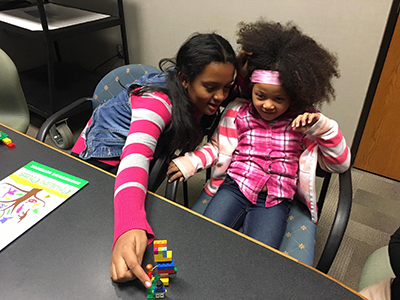
FIRST LEGO League Jr. participants from YouthLink STEM Academy in South Carolina work on their Engineering Notebook.
YouthLink levels the playing field for the young people it serves by bringing the programming to them – establishing new teams at sites that can provide mentors, facilitators, and supportive service providers, including local churches with strong youth programs, schools, and other community sites. One partner, South Carolina 4-H Youth Development, hosted a FIRST® LEGO® League Jr. expo during their annual Engineering Challenge event, which gave teams an opportunity to share their Show Me posters and LEGO® Education WeDo 2.0 models with the community, celebrate, and have fun.
During the 2017-2018 season, YouthLink engaged a diverse group of 762 rural, mostly impoverished students in hands-on STEM activities and educational programming through FIRST. For the 2018-2019 season, the organization plans to expand to 168 FIRST LEGO League Jr. (ages 6-10) teams and 10 new FIRST® LEGO® League (ages 9-14) teams — bringing total participation to 1,108 students. In addition, the organization offers summer camps and other off-season activities, all free of cost to qualifying students. YouthLink also works with donors including Duke Energy, Wells Fargo, and Walmart to cover registration fees, food, snacks, transportation, travel, expos, competitions, and team shirts.
Blassingame says the impact has been inspiring. One FIRST LEGO League Jr. participant, Avery, told him, “I can build anything with LEGO and WeDo; just give me a few pieces!” Another young participant, Kamiyah, reported, “I just really liked being able to work with the robots … It was fun, and I want to do this as my job one day!"
Strategy: Connect experienced and rookie teams for peer-to-peer or near-peer mentoring
Creating opportunities for young people to teach each other builds skills, confidence, and relationships among both mentors and mentees.
Successful FIRST partners know that one key to expanding their programs is to build on the expertise of existing teams, mentors, and coaches. It benefits the rookie teams, whose members and coaches are often overwhelmed with first-year challenges, but also the young people from more established teams, who have a chance to reinforce their skills and expertise by sharing them.
Erica Compton of the Idaho STEM Action Center explained that building a formal mentoring program was critical to her organization’s success this year. “After supporting 53 teams in the 2016-2017 season, 66 percent of which were rookie teams, we had concerns that without additional support, many rookie teams would struggle or choose not to participate again. We designed a plan to better connect our returning teams and a few new teams to more seasoned, established teams, supporting virtual and in-person meet-ups throughout the season,” Compton said. “We also engaged college interns who would be majoring in STEM or education to support the teams during the season.”
Soon after teams were formed, they were assigned into regional “learning pods,” which brought together seasoned veteran teams and newer teams. The pods met virtually to get to know each other and to brainstorm strategies and resources for the upcoming season. A team of interns — some with FIRST experience, but all majoring in STEM fields — helped the teams connect and offered additional support.
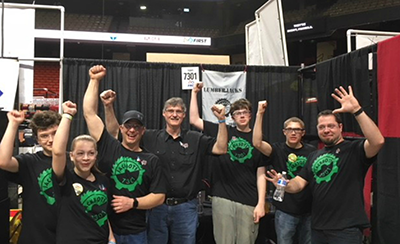
Idaho STEM Action Center’s FIRST Robotics Competition Team 7301 won a rookie award at the 2018 Idaho Regional.
“Established teams brought a wealth of information to our new teams — the insider knowledge that teams get from years being together,” Compton added. “These teams also made a concentrated effort to meet before the official season kickoff, plus worked to connect at a kickoff event close to them, making invaluable personal connections.”
That sharing of knowledge paid off. One new FIRST® Robotics Competition (ages 14-18) team won a rookie award at a local competition event, earning a spot at the international FIRST Championship in Houston. “We know a lot of that is the team and the coach themselves, but they took advantage of the support offered from more experienced local teams too, which we are sure helped,” Compton said.
Strategy: Link students to the larger community
Building strong bonds with FIRST teammates, coaches, mentors, corporate sponsors, and partners can be rewarding — and open doors to jobs, internships, and higher education.
Through FIRST, team members form strong bonds with their teammates, their coaches, their mentors, and often, critically, people outside their immediate circle of acquaintances and frame of reference. FIRST opens doors for young people, connecting them to the larger world.
Lindsey Cosgrove of the Girl Scouts of Greater New York says that linking her organization’s teams to other, similar groups has been one of the three main elements in its success — as important as financial support and training for coaches. “Girl Scouts of Greater New York offers several staff-led STEM programs, and there are many STEM-focused badges that Girl Scouts earn in their troops. However, these programs do not provide opportunities for girls to meet other young people outside of Girl Scouts, who are also interested in STEM,” Cosgrove said. “FIRST connects students from all different youth organizations and schools across the five boroughs of New York City — from low-income to wealthy neighborhoods. They come together through FIRST events. Furthermore, the act of competing gives girls the opportunity to cheer for each other and show the other competitors that Girl Scouts can be serious about STEM.”
Strategy: Provide training and resources to coaches/facilitators
Providing in-person and online training in fundraising, team safety, building, and coding, among other topics, can give confidence to inexperienced coaches.
New FIRST team coaches sometimes find robotics intimidating, especially if they don’t have a background in coding or engineering. Community organizations, in particular, often rely on volunteers who may not have specific experience in robotics or STEM programs. FIRST provides an abundance of resources, both online and in person, to help new coaches and facilitators get started with everything from fundraising and team safety to building and coding. Plus, there’s a huge community of existing FIRST teams, coaches, mentors, and volunteers who are very eager to share their knowledge, resources, and insight. FIRST can also connect organizations to local FIRST leaders for additional guidance.
Community organizations that serve disadvantaged young people understand that culture shapes our biases and beliefs about people, and it’s important to train new staff and volunteers on equity, diversity, and inclusion. FIRST empowers all new coaches and mentors to create diverse, inclusive, and equitable teams by providing access to the free “Strategies for Inspiring Success for All” training module online course from FIRST, which includes specific strategies to support community outreach, student participation, persistence, engagement, and success with FIRST programs.
In addition to the training modules, PAST Foundation, a Columbus, Ohio-based non-profit organization dedicated to STEM education, provided additional resources to coaches via podcasts. The foundation’s Girls Who Lead initiative partnered with Girl Scouts of Ohio's Heartland and area schools to form 14 FIRST teams for girls and young women. “The teacher and coaches were very engaged throughout the program and feedback suggested that they feel more prepared for next season,” said Andy Bruening, director of Bridge Programs at PAST Foundation.

Strategy: Engage students in FIRST programs year-round
Community organizations, which operate year-round, are ideally positioned to keep young people engaged by extending programming into the summer months.
Community organizations operate year-round, creating opportunities to extend young people’s FIRST activities beyond the traditional robotics competition schedule by hosting their own culminating robotics events or extending programming into the summer months.
For example, South Carolina’s YouthLink is expanding its FIRST programming to offer out-of-season summer camps, workshops, and boot camps on coding and programming LEGO® MINDSTORMS® EV3 robot kits for FIRST LEGO League and LEGO Education WeDo 2.0 robot kits for FIRST LEGO League Jr. at no cost to students and educators. YouthLink also hosted a celebratory expo for students.
Similarly, the Girl Scouts of Montana and Wyoming expanded their program with supplemental sessions focused on the 2017-2018 FIRST LEGO League season’s water-themed challenge at schools and partner events, including “Engineer that Girl.” In 2018, the organization hosted its first-ever, week-long LEGO summer camp at two council campgrounds in Red Lodge and Butte, Montana. FIRST LEGO League team participants were given preference for scholarship stipends to cover camp costs.
Making a difference through community-based organizations
Organizations like the YMCA, Girl Scouts, 4-H, or other community-focused institutions can make a genuine difference in young people’s lives in so many ways — not least by inspiring a passion for STEM. These organizations can be valuable partners in reaching underserved, underrepresented, and vulnerable young people who might not otherwise have access to STEM programming.
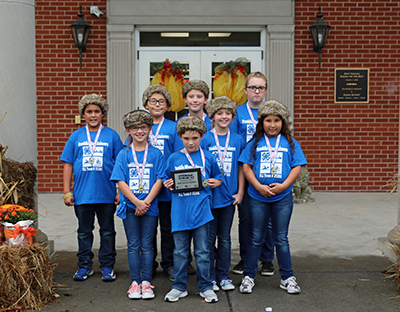
FIRST LEGO League team "Franklin Mountaineers" displays the Core Values award.
FIRST STEM Equity Community Innovation Grants reached 2,336 students on 308 FIRST teams during the 2017-2018 season. 1,911 of those students were served through community-based organizations, reaching many young people who might otherwise not have had access to STEM learning opportunities: 72 percent of students were economically disadvantaged, 48 percent were female, 36 percent were African American, and 20 percent were Hispanic and Latino/a.
Nearly all coaches in these programs reported significant improvement in STEM learning, interest in STEM careers, problem-solving ability, and leadership and teamwork skills by implementing FIRST programs. Coaches reported that, compared to before the program was implemented, students are more likely to accept input from others, to persevere through difficulties, to accept failure as part of learning, and to ask more questions about a problem.
Impact should continue to grow over the coming years, as team members learn and achieve goals in STEM that extend beyond their FIRST programs. “We have seen incredible growth from girls participating in our robotics program,” said Cosgrove of the Girl Scouts of Greater New York. “They have gained confidence by trying new things, learning new skills, and practicing public speaking. We have also seen that they have grown to see STEM as a part of their identity, which is essential as research has shown that if young people don’t see themselves as ‘STEM people’ at an early age, it is extremely unlikely that they will pursue STEM in college and their careers.”

At FIRST, we are committed to bring our programs to the students who can benefit from them the most. We’re constantly developing new strategies to create greater, more equitable access, and to help every child succeed. For more on our commitment to Equity, Diversity, and Inclusion, visit firstinspires.org/diversity.
FIRST Equity, Diversity, and Inclusion sponsors include Apple, Arconic Foundation, Qualcomm Incorporated, Bosch, Caterpillar, Cisco, Cognizant, The Dow Chemical Company, Fidelity Charitable, GM, GitHub, John Deere, Verizon, and individual donors, among others.
